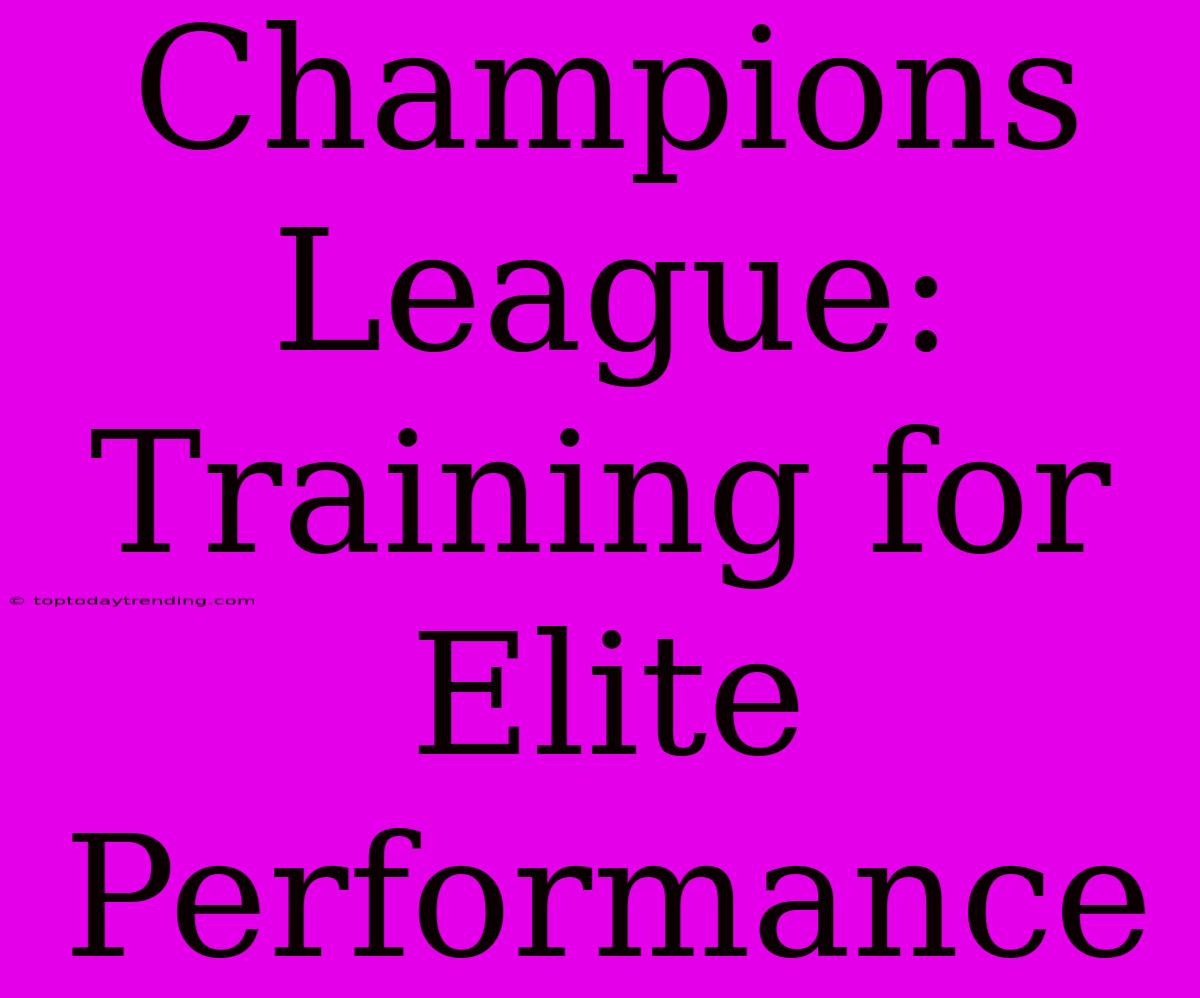Champions League: Training for Elite Performance
The Champions League is the pinnacle of club football, showcasing the world's best players and teams. Reaching the summit requires not only exceptional talent but also rigorous, specialized training designed to push players to their absolute limits. This article delves into the multifaceted approach to training employed by top Champions League teams, exploring how they prepare their players for the grueling demands of the tournament.
Physical Conditioning: Building a Foundation
The Champions League demands a high level of physical fitness. Players must be able to sprint, jump, and tackle at top speed while maintaining endurance for 90 minutes of intense play. Training programs focus on:
- Strength and Conditioning: Building muscle mass, power, and explosiveness through weight training, plyometrics, and agility drills.
- Cardiovascular Endurance: Enhancing stamina through long-distance runs, interval training, and high-intensity interval training (HIIT).
- Flexibility and Mobility: Maintaining range of motion and injury prevention through stretching, yoga, and Pilates.
Example:
- A typical training session might involve a warm-up, followed by strength training exercises like squats and deadlifts, and then move into agility drills and sprinting sessions. This would be followed by a cool-down and stretching.
Technical Skills: Mastering the Art of the Game
Champions League teams possess exceptional technical ability. Their training regimens are designed to refine and enhance these skills:
- Ball Control: Improving first-touch accuracy, dribbling skills, and close control through drills focusing on precise footwork and ball manipulation.
- Passing and Shooting: Developing precise passing range, accurate long-range shooting, and the ability to finish in tight spaces.
- Tactical Awareness: Sharpening tactical understanding through practice sessions simulating match scenarios and analyzing opponent tactics.
Example:
- Teams conduct drills designed to improve passing accuracy, such as "keep-away" games and "passing squares," where players must pass the ball accurately to their teammates while maintaining possession.
Psychological and Mental Toughness
Champions League matches are intense pressure cookers. Top teams prioritize psychological preparedness:
- Mental Toughness: Building focus, resilience, and the ability to perform under pressure through meditation, mindfulness exercises, and visualization techniques.
- Leadership Development: Developing leaders capable of motivating teammates and inspiring the team to perform at their best.
- Team Cohesion: Enhancing communication and teamwork through team-building activities and group discussions.
Example:
- Teams might engage in psychological exercises like "pressure drills" where players are placed in simulated high-pressure situations to hone their ability to stay focused and perform under stress.
Recovery and Regeneration:
The demands of Champions League play are physically and mentally taxing. Players must have the opportunity to recover and regenerate effectively:
- Active Recovery: Engaging in low-impact exercises like swimming, cycling, and yoga to promote blood flow and muscle recovery.
- Sleep Management: Ensuring adequate sleep for optimal physical and mental recovery.
- Nutrition and Hydration: Following a balanced diet rich in nutrients and staying hydrated to fuel performance and aid in recovery.
Example:
- Teams may use ice baths or cryotherapy to reduce inflammation and speed up muscle recovery after intense training sessions.
Data-Driven Training and Analysis
The use of technology plays an increasingly important role in Champions League training:
- Performance Tracking: Utilizing GPS tracking devices and video analysis to monitor player fitness, movement patterns, and tactical decision-making.
- Data-Driven Adjustments: Using the gathered data to adjust training programs, identify weaknesses, and optimize performance.
- Individualized Training Plans: Developing personalized training regimens for each player based on their individual needs and strengths.
Example:
- Teams can use data analysis to identify a player's sprint speed, distance covered, and tactical decisions during a match. This data can then be used to tailor training sessions to improve their performance in specific areas.
The Road to Glory
Training for the Champions League is a demanding yet rewarding process. Through rigorous physical conditioning, honed technical skills, strong psychological resilience, and data-driven approaches, top teams strive to achieve footballing excellence. By understanding the intricacies of their training programs, we gain insight into the dedication and meticulous preparation required to reach the summit of European club football.

